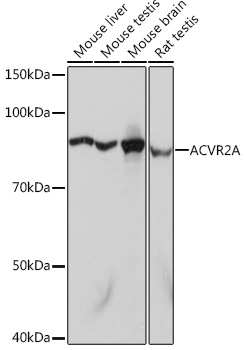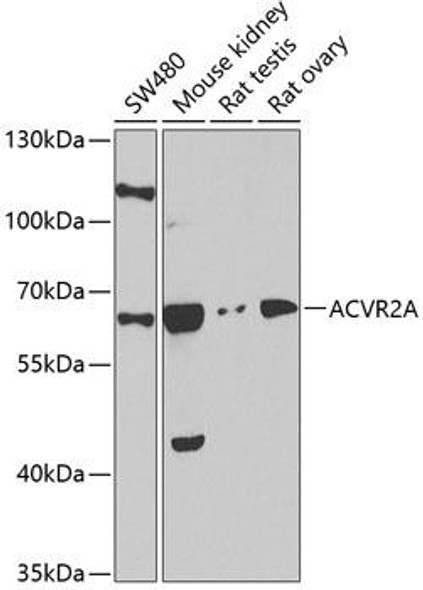Cell Biology Antibodies 17
Anti-ACVR2A Antibody (CAB5237)
- SKU:
- CAB5237
- Product Type:
- Antibody
- Reactivity:
- Human
- Reactivity:
- Mouse
- Reactivity:
- Rat
- Host Species:
- Rabbit
- Isotype:
- IgG
- Research Area:
- Cell Biology
Description
| Antibody Name: | Anti-ACVR2A Antibody |
| Antibody SKU: | CAB5237 |
| Antibody Size: | 20uL, 50uL, 100uL |
| Application: | WB |
| Reactivity: | Human, Mouse, Rat |
| Host Species: | Rabbit |
| Immunogen: | A synthesized peptide derived from human ACVR2A |
| Application: | WB |
| Recommended Dilution: | WB 1:500 - 1:2000 |
| Reactivity: | Human, Mouse, Rat |
| Positive Samples: | 293T, A-549, SW481Mouse liver, Mouse testis, Mouse brain, Rat testis |
| Immunogen: | A synthesized peptide derived from human ACVR2A |
| Purification Method: | Affinity purification |
| Storage Buffer: | Store at -20'C. Avoid freeze / thaw cycles. Buffer: PBS with 0.02% sodium azide, 0.05% BSA, 50% glycerol, pH7.3. |
| Isotype: | IgG |
| Sequence: | Email for sequence |
| Gene ID: | 92 |
| Uniprot: | P27037 |
| Cellular Location: | |
| Calculated MW: | 45kDa/57kDa |
| Observed MW: | 80KDa |
| Synonyms: | ACTRII, ACVR2 |
| Background: | This gene encodes a receptor that mediates the functions of activins, which are members of the transforming growth factor-beta (TGF-beta) superfamily involved in diverse biological processes. The encoded protein is a transmembrane serine-threonine kinase receptor which mediates signaling by forming heterodimeric complexes with various combinations of type I and type II receptors and ligands in a cell-specific manner. The encoded type II receptor is primarily involved in ligand-binding and includes an extracellular ligand-binding domain, a transmembrane domain and a cytoplasmic serine-threonine kinase domain. This gene may be associated with susceptibility to preeclampsia, a pregnancy-related disease which can result in maternal and fetal morbidity and mortality. Alternative splicing results in multiple transcript variants of this gene. [provided by RefSeq, Jun 2013] |
| UniProt Protein Function: | ACVR2A: a tyrosine-kinase like receptor kinase of the STKR family. The holoreceptor receptor is a heteromeric complex of receptor serine kinases which include at least two type I (I and IB) and two type II (II and IIB) receptors. Each is composed of a ligand-binding extracellular domain with cysteine-rich region, a transmembrane domain, and a cytoplasmic kinase domain. Type II receptors are required for binding ligands and for expression of type I receptors. Type I and II receptors form a stable complex after ligand binding, resulting in phosphorylation of type I receptors by type II receptors. Type II receptor kinases are apparently constitutively active. |
| UniProt Protein Details: | Protein type:Membrane protein, integral; Kinase, protein; Protein kinase, TKL; EC 2.7.11.30; Protein kinase, Ser/Thr (receptor); Motility/polarity/chemotaxis; TKL group; STKR family; Type2 subfamily Chromosomal Location of Human Ortholog: 2q22.3 Cellular Component: cell surface; integral to plasma membrane; cytoplasm; plasma membrane; receptor complex Molecular Function:transforming growth factor beta receptor activity; protein serine/threonine kinase activity; protein binding; activin receptor activity; protein self-association; growth factor binding; metal ion binding; activin binding; coreceptor activity; transmembrane receptor protein serine/threonine kinase activity; ATP binding; receptor signaling protein serine/threonine kinase activity; PDZ domain binding Biological Process: embryonic skeletal development; positive regulation of erythrocyte differentiation; regulation of BMP signaling pathway; activin receptor signaling pathway; Sertoli cell proliferation; gastrulation with mouth forming second; positive regulation of bone mineralization; protein amino acid phosphorylation; BMP signaling pathway; anterior/posterior pattern formation; positive regulation of osteoblast differentiation; positive regulation of activin receptor signaling pathway; transmembrane receptor protein serine/threonine kinase signaling pathway; mesoderm development; spermatogenesis; sperm ejaculation; regulation of nitric-oxide synthase activity; positive regulation of protein amino acid phosphorylation; determination of left/right symmetry; penile erection |
| NCBI Summary: | This gene encodes a receptor that mediates the functions of activins, which are members of the transforming growth factor-beta (TGF-beta) superfamily involved in diverse biological processes. The encoded protein is a transmembrane serine-threonine kinase receptor which mediates signaling by forming heterodimeric complexes with various combinations of type I and type II receptors and ligands in a cell-specific manner. The encoded type II receptor is primarily involved in ligand-binding and includes an extracellular ligand-binding domain, a transmembrane domain and a cytoplasmic serine-threonine kinase domain. This gene may be associated with susceptibility to preeclampsia, a pregnancy-related disease which can result in maternal and fetal morbidity and mortality. Alternative splicing results in multiple transcript variants of this gene. [provided by RefSeq, Jun 2013] |
| UniProt Code: | P27037 |
| NCBI GenInfo Identifier: | 114722 |
| NCBI Gene ID: | 92 |
| NCBI Accession: | P27037.1 |
| UniProt Secondary Accession: | P27037,Q53TH4, Q6NWV2, Q92474, B2RAB8, B4DWQ2, D3DP85 |
| UniProt Related Accession: | P27037 |
| Molecular Weight: | 513 |
| NCBI Full Name: | Activin receptor type-2A |
| NCBI Synonym Full Names: | activin A receptor, type IIA |
| NCBI Official Symbol: | ACVR2A |
| NCBI Official Synonym Symbols: | ACVR2; ACTRII |
| NCBI Protein Information: | activin receptor type-2A |
| UniProt Protein Name: | Activin receptor type-2A |
| UniProt Synonym Protein Names: | Activin receptor type IIA; ACTR-IIA; ACTRIIA |
| Protein Family: | Activin receptor |
| UniProt Gene Name: | ACVR2A |
| UniProt Entry Name: | AVR2A_HUMAN |







